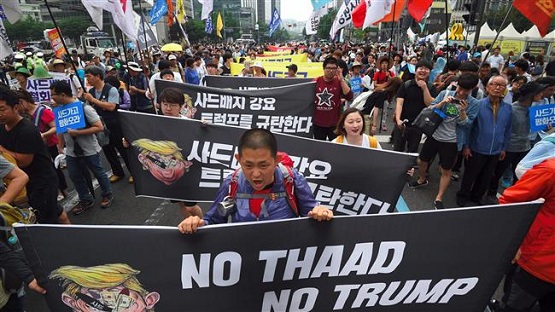Thousands of people in the South Korean capital, Seoul, have protested against the deployment of an advanced American missile system in their country, accusing US President Donald trump of "forcing" the South's leaders to install the controversial system in the Korean Peninsula.
Some 4,000 people demonstrated near the US embassy in Seoul on Saturday to voice their strong dissent against the deployment of the Terminal High-Altitude Area Defense (THAAD), the largest rally since the two countries agreed to deploy the system in southeastern South Korea.
Demonstrators carried placards and banners that read "Trump stop forcing (South Korea) to deploy THAAD" and "No THAAD, No Trump."
The protesting march included residents from the southeastern county of Seongju, where the missile system is being installed. They say the deployment will jeopardize their health and the environment in which they live, arguing that its presence could also make them a priority target for possible attacks by North Korea.
South Korea decided to host the missile system last year under ousted President Park Geun-hye to deter perceived threats from the North. The first pieces of the missile system started arriving at the Osan Air Base in South Korea in March with the approval of Seoul’s then-caretaker administration.

Critics accused Park of steamrollering the project through a hasty environmental review in his last months in office. Though parts of the system are in place now, South's new leader, President Moon Jae-in, suspended further installment, calling for a comprehensive environmental impact assessment.
Both North Korea and China believe that the THAAD deployment is meant to expand US hegemony. They also believe that the deployment of the US missile system on the Korean Peninsula would destabilize the region’s security by upsetting the military status quo.
Beijing, which has long opposed the deployment of the missile system so close to its borders, has called on Washington and Seoul to remove the system. But China has also expressed concern about the North Korean’s nuclear activities and has banned imports of North Korean coal over the issue.

A battery of the THAAD is said to be capable of firing up to 48 interceptor missiles and consists of six truck-mounted launchers, fire control and communication equipment as well as a powerful X-band radar.
The North, currently under a raft of UN crippling sanctions over its nuclear and missile programs, says it will continue those programs until Washington ends its hostility toward the country, slamming the controversial deployment THAAD in South Korea.
Pyongyang says the advanced missile system threatens its sovereignty, while Seoul claims that THAAD only serves as deterrence against North's possible attacks.
LINK: https://www.ansarpress.com/english/7282
TAGS:































 online news tv
online news tv




